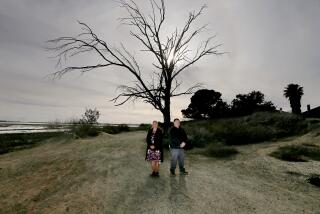Will Lay Indictment Be a Drag on Bush Campaign?
The criminal indictment of former Enron Corp. Chairman Kenneth L. Lay loomed Thursday as a new political minefield for President Bush, and the White House moved quickly to distance the president from the man he once affectionately called “Kenny Boy” and who donated more than $500,000 to his campaigns over the years.
Some political analysts said Lay’s indictment could hurt the president’s reelection chances by reminding voters of the ties between Bush and the collapsed energy company, and by reinforcing a perception that the Bush administration is cozy with corporate America. At the same time, some analysts said, the prosecution of Lay could allow Bush to argue that he is tough on corporate crime.
Lay himself rued his ties to Bush, suggesting Thursday that his connections to the president were at the root of his indictment.
Citing his past support for Bush, Lay told reporters at a Houston news conference, “It was going to take a lot more courage for a prosecutor to not indict me than to indict me.”
At the White House, Press Secretary Scott McClellan declined to discuss the government’s case against Lay, saying, “This is a Justice Department matter, and we expect the Justice Department to do their job when it comes to cracking down on corporate wrongdoing.”
He also portrayed Bush as someone who granted no special favors when it came to possible corporate crime.
“The president has made it very clear that we will not tolerate dishonesty in the boardroom,” McClellan said.
He added that Lay had “supported Democrats and Republicans alike, including the president.”
More than 70% of the $2.4 million Enron and its executives donated to federal candidates in 2000 went to Republicans, according to public interest groups that track campaign finance.
To date, more than two dozen onetime senior Enron officials have been indicted on charges that include fraud and insider trading.
The energy trading company collapsed in late 2001.
The cloud over Enron came amid a rash of corporate accounting scandals and turned into something of a public relations problem for the administration in its early months, in part because numerous senior administration officials, or people close to the White House, had ties to Enron.
They included White House Counsel Alberto R. Gonzales, a partner in a Houston law firm that worked for Enron. Others included former Army Secretary Thomas E. White, an executive with an Enron subsidiary; Ed Gillespie, now chairman of the Republican National Committee, who lobbied for Enron; Gillespie’s RNC predecessor, Marc Racicot, who also lobbied for the firm; and former economic advisor Lawrence B. Lindsay and Trade Representative Robert B. Zoellick, both Enron advisors.
Lay and Bush were so close, going back to Bush’s days as governor of Texas, that they regularly exchanged “Dear George” and “Dear Ken” letters that covered subjects as diverse as personal fitness and business matters.
After Bush became president, Enron lobbied the White House for the appointment of two candidates to the Federal Energy Regulatory Commission. Both were appointed. And as Vice President Dick Cheney’s energy task force privately formulated a national policy, Lay met with Cheney.
Democrats, including the presidential campaign of John F. Kerry and John Edwards, portrayed Lay’s indictment as long overdue.
“It’s about time,” said Sen. Ernest F. Hollings (D-S.C.), the top Democrat on the Senate Commerce Committee. “If lawyers John Kerry and John Edwards were in office, the Ken Lays of the world would have been locked up years ago.”
Said Kerry campaign spokesman Chad Clanton: “Well, it sure took long enough. From the start, this administration has taken a lackadaisical, slow-walk approach to cracking down on corporate abuses. It’s probably why most Americans see the Bush-Cheney team as on the side of big corporations instead of ordinary working people.”
Political analysts differed over the Enron scandal’s impact on the Bush reelection bid.
“Is this helpful for the president? No,” said Charlie Cook, publisher of the Cook Political Report. “But I think his fate is so inextricably tied to Iraq and jobs that everything else pales in comparison.... I think Lay is a one-day story that will sporadically reappear but not cause significant damage.”
Larry J. Sabato, a University of Virginia political scientist, said Lay’s indictment could help Bush. “It’s a good thing for Bush that Ken Lay has finally been indicted, suggesting that corporate crime is being taking seriously by the administration.”
“But it also gives Democrats an opening to remind voters of the Bush family’s close relationship with Ken Lay and Enron,” Sabato said. “Truly, this is one controversy that cuts both ways.”
Andrew Kohut, director of the Pew Research Center for the People and the Press, said that although corporate scandals, at least to date, had not figured prominently in the presidential campaign, that could change.
“It hasn’t been an issue that candidates have been talking about, because the mega-issues of Iraq and the economy have sucked up all the oxygen. But it is something the Democrats can use to fire up their base and can appeal to the swing voters,” Kohut said.
Kohut noted that a Pew poll in early January 2001 found that 66% of people predicted that corporations would be among the winners in a Bush administration, and 9% said big business would be among the losers.
A poll taken just before Bill Clinton took office in January 1993 found the public about evenly divided on the question, with 34% naming big business as one of the winners in a Clinton administration and 33% naming corporations as losers.
More to Read
Get the L.A. Times Politics newsletter
Deeply reported insights into legislation, politics and policy from Sacramento, Washington and beyond. In your inbox three times per week.
You may occasionally receive promotional content from the Los Angeles Times.






